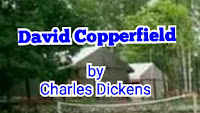"David Copperfield" is an autobiographical novel written by a popular novelist Charles Dickens. Charles Dickens was the most popular novelist of the Victorian age. It was published from 1849 to 1850 in nineteen monthly parts. The original title of David Copperfield is very long. It is "The Personal History, Adventures, Experience and Observation of David Copperfield the Younger of Blunderstone Rookery". In this novel, Charles Dickens describes his own experiences of childhood, boyhood and manhood in an interesting way. The story of David Copperfield is considered the real story of Charles Dickens. Therefore it is an autobiographical novel.
- The birth and parentage of David Copperfield
David Copperfield is the chief character in the novel. This novel revolves around his life from birth to marriage. He was born in the Blunderstone, Suffolk. He was born after the death of his father. When David was born, his aunt suddenly came back home in the hope of a girl. But when she saw a baby boy, she again became angry and go back from there because she wanted a baby girl.
As David was a fatherless child still he was happy in his early days. Both his mother and his maidservant, miss Peggotty took care of him with happiness. His life was passing happily. His mother was a fainthearted and weak-minded woman. She never could claim for anything with firmness. She lived her life in fear. An important turn came in David's life when her mother fell in love with Mr Murdstone. Mr Murdstone was her neighbour who lived there with his unmarried sister. David's mother decided to marry him. Murdstone also wanted to marry with her. They got married when David went to Yarmouth with his housemaid Peggotty.
There were Peggotty's elder brother and her nephew Ham and niece Emily in the house. Thus Mr Murdstone and David's mother got married in the absence of David. David did not like Mr Murdstone as he was a merciless man who always tried to disturb and punish David in any way. After marriage, Mr Murdstone began to live in her house. Miss Murdstone, the sister of Mr Murdstone also started to live with them. She was a clever lady. She took the charge of the whole household in her control. Thus David's mother seemed like a guest in her own home. She lived like a guest in her own home. Because her mother was a weak-minded woman so she could not speak against Miss Murdstone firmly. And now her maid, Miss Peggotty also could not help her in any way. Thus happy days of David also were over very soon.
- The torture of David by his stepfather
Now Mr Murdstone and his sister tried to disturb David intentionally. They began to torture David and his mother. His stepfather was a kind of stern and cruel man. He did not allow David's mother and maid to treat David with love and politeness. His stepfather started to teach David his lessons of school at home. He mostly punished him cruelly when he didn't learn his lesson properly. The condition of his mother and David was very miserable. Before it, David used to learn his lesson from his mother in a pleasant way but now it became a daily misery for him.
The behaviour of Mr Murdstone was very cruel towards David. David mostly forgot his lesson in the presence of Mr Murdstone and cruel Murdstone never missed a chance of beating him mercilessly while teaching him. Not only Mr Murdstone but also his sister was very cruel for David. She also did not like his presence at home. One day while teaching David Mr Murdstone beat him. Then David bit his hand to save himself from punishment.
After this incident, he was kept closed in a dark room as a punishment. After it, Mr Murdstone decided to send David to a boarding school for further education. He wanted to send him to London. He also informed the headmaster about the incident. Thus David was sent to London for further education. Thus Mr Murdstone became successful in keeping David away from his mother and his house. It was really a misery for both mother and David. David's mother and Peggotty were very sad about this incident.
- David's presence in a boarding school
After the incident of biting Mr Murdstone, David was sent for a boarding school in London. Now he had become a student of a school named Salem House. It belonged to Mr Creakle. A coachman took David to Yarmouth. His name was Barkis who loved Peggotty, maid of David. Therefore he asked David to tell his maid about his love and his desire to marry her. After it, David went to London from Yarmouth.
In London, Mr Mell received David. Mr Mell was a poor teacher of Salem House where David was sent for study. Mr. mell was very humble towards David. He took him to the boarding house with pleasure. On the other hand Mr Creakle, the principle of Salem House was very cruel and harsh in nature.
He took pleasure in beating boys mercilessly. There was one more man in the school. His name was Tungay. He helped his master Mr Creakle in his cruel work. Mr Murdstone knew Mr Murdstone. therefore he informed Mr Creakle about David's offence. Thus Mr Creakle gave special attention to David and he tied a notice on the back of David written on it "Beware of him because he bitts".
David made two friends at this school. One was Steerforth who came from a rich family and treated with kindness by Mr. creakle and the second was Traddles who came from an ordinary family was mostly beaten by Mr Creakle. Traddles was a happy natured boy.
Once Steerforth insulted Mr Mell by saying that Mr Mell's mother was living in an almshouse on charity. After knowing about Mr Mell's mother that she was an almswoman or a beggar, He dismissed Mr Mell immediately. After this incident, one day Mr Peggotty and Ham came to meet David at Salem House. There David introduced his friend Steerforth to them.
- David's arrival at home during holidays
After finishing the first term at school David went home for the holidays. In the meantime, his mother gave birth to a baby and David was very excited for the baby but he found no change in the behaviour of Mr Murdstones and his sister towards him. They both did not like his presence there. David was very sad to see all this. He was worried about his mother because she was living a very unhappy life. Mr Murdstone did not want to allow David to meet freely with Peggotty. He was very sad at his own home. He went back to school after finishing his holidays.
- The death of David's mother
One day David was informed by Mrs Creakle about his mother's death. After it, he became very sad about hearing it. He felt himself alone in this world. He was crying for his mother. When he reached at his home, he came to know that the baby had also died with his mother. The funeral was not attended by Mr Murdstone and his sister. Peggotty told Mr David that Mr Murdstone and his sister treated his mother very badly. They both behaved very bad with his mother and tortured her. Now David was very sad after hearing all this. He was feeling lonely without his parents in this world. The only person who cared about him was Peggotty. Therefore he also had to leave his school, Salem House. He could not finish his education.
After the funeral, he went to Yarmouth with Peggotty. David stayed there at her boathouse. Peggotty got married to Barkis whom she loved. Now again after the marriage of Peggotty David was alone in the world. As his mother had died and his stepfather neglected him. He only felt comfortable with the books which his father gave him. He mostly used to read those books to console himself.
David was sent to London to do work as a labourer by Miss Murdstone at an early age of ten. David started to do work in the warehouse of the firm named "Murdstone" and Grimsby". There he had to examine empty wine bottles and paste labels on them. He had to work with low-class street boys at the wine shop. So he had lost all his hopes to be a learned and respected social man.
- David's stay with Micawber and his family
While working in the firm he stayed with Mr Micawber who lived in Windsor Terrace, city road in London. Mr Micawber had a wife and four children in his family. He was a friend of Mr Murdstone. Mr Micawber was a freak and polite person but he was a great borrower of money. His income was not fixed. His wife told David that her husband had borrowed money from many creditors. They often came to their house for repayment and harassed them but his husband was unable to pay those debts. His wife told that they felt very depressed when the creditors came to their house for repayment of their loans.
They both were flexible in temperament when creditors went back they immediately became happy and relaxed but in front of them, they seemed very unhappy. Mr Micawber was very fond of saying again and again that "something would turn up". He also liked to speak the phrase"in short". Mr Micawber established a private school for girls to increase his income but failed. At last Mr, Micawber was arrested for not paying his debts and carried over to the king's bench prison in the Borough but very soon he was released from the imprisonment. After it, Mr Micawber decided to go to Plymouth to get a job with the help of his relatives. David felt very much attachment to the family when they went to Plymouth, he felt lonely again.
David did not want to work in the warehouse with street boys so he decided to run away from there. One day he ran away from the warehouse and started his journey to Dover. He came to know that his aunt Miss Betsey Trotwood lived at Dover. Therefore he borrowed some money, a half- guinea from Peggotty and started his journey to Dover. In the meantime, he was robbed by the driver of a donkey cart which he had hired to carry him and his luggage to the coach office. Now he had no money.
Without money, it was difficult to go at Dover but he had to walk to cover all distance to reach Dover. He had no other way to go there. In fact, he had to sell his waistcoat and jacket to buy food. He had become very tired with hunger and cold while reaching Dover. Finally, he reached at Dover where he was received politely by Miss. Betsey. There was one more man who lived in Miss. Betsey's house. She had a high opinion of him. Actually Miss. Betsey was a married woman who had separated from her husband and now lived as an unmarried woman.
- David was cared by his aunt
After meeting his aunt, he told her whole story. When Miss. Betsey came to know about his pathetic story, she felt love and sympathy for David. Then Miss Betsey informed Mr Murdstone about the arrival of David in her house in a miserable condition. Mr Murdstone and his sister came to meet Miss Betsey and asked to send David with them but David refused to go back with them. Now Miss Betsey cared for David very much and wanted to give him a good education. So David started a new life with her aunt. David got a good education
Miss Betsey got David admitted to a school named Doctor Strong. It was a reputed school. There David stayed in the house of Mr Wickfield. He was a widower and lived there with his daughter Agnes. David was very happy there.
- David as a friend of Agnes
The new school was under the charge of Dr Strong. Dr Strong had a pretty wife named Annie. There were two more men named Jack Maldon and Uriah Heep. Jack Maldon was a cousin of Annie who was in need of a job and Mr Wickfield was helping him to find a job. Uriah Heep was a clerk of Mr Wickfield who always pretended to be polite.
Slowly David and Agnes became good friends. But David did not like Uriah Heep because he was a man of deceit. He always tried to impress David. One day at his request David met him and his mother. They both were very clever and wanted to get information about the business of Mr Wickfield. At there David met with Mr Micawber by chance. David introduced him with Uriah Heep and his mother. He was still in financial problems. From there David went to Micawber's house to meet his wife. There he came to know that Mr Micawber was in need of a job.
Dr Strong was working upon an English Dictionary. Before joining the school, Miss Betsey told David about Mr Dick who was working upon his memories. After some days Jack Maldon went to India to find a job. David used to go to Dover to meet his aunt once a month. Mr Dick used to meet him on every alternate Wednesday.
Now David had become a young man of seventeen. He fell in love with a girl named Shepherd. But that girl developed a friendship with another boy. After it, David fell in love with a girl named Miss Larkins but very soon she also got married to another boy.
- David's get back to his aunt's house
After completing his education David came back to his aunt's house at Dover. He was very close to Agnes, the daughter of Mr Wickfield. Suddenly Mr Wickfield started to drink heavily and his clerk Uriah Heep started to take advantage of this situation as much as he can. In the meantime, Annie's mother came to stay with Dr Strong and Annie. She was given the nickname 'old soldier' by the students of Dr Strong. On the other hand, Jack Maldon who was in India was not happy there and wanted to come back to London. Annie's mother was worried about Jack Maldon after all he was his nephew.
- David's meeting with his old friends-
One day David met with his old school friend Steerforth. There he met his mother and her companion Rosa Dartle. After it, David went to Yarmouth to meet his old friends of the boathouse. David went there with Steerforth. Mr Peggotty and Ham were very glad to see them. Steerforth also met Emily who was a very beautiful girl. Emily wanted to marry with Ham.
They all were celebrating their meeting. David also met there with Peggotty, His old nurse and Barkis, her husband. Emily also came to Peggotty's house. There Emily helped a girl named Martha Endell by giving her some money. Martha wanted to go to London to start a new life.
Martha met Emily at the shop of Mr Omer who was a funeral furnisher in Yarmouth. Emily also worked there.
- Miss Betsey's desire to see David as a proctor--
Miss Betsey wanted David to become a proctor. A proctor was a kind of attorney who used to practise at courts. It was known as Doctor's Commons. Miss Betsey articled him to the firm of Messrs Spenlow and Jorkins and paid a thousand pounds for it. david was very happy now.
- Mr Wickfield's visit to London--
Mr Wickfield came to London with Agnes and Uriah Heep. David loved Agnes and she also loved him. Now Mr Wickfield agreed to make Uriah Heep as an equal partner in his business. Uriah Heep succeeded in getting partnership as he wanted. After the starting of his professional career, David started drinking with Steerforth and other young men. Now Agnes warned David against Steerforth and also told him about the bad intention of Uriah Heep who had taken advantage of his father's weakness. So David invited Uriah Heep to know his plan. After meeting with Uriah Heep, David came to know that he wanted to marry Agnes.
Now David fell in love with Dora who was the daughter of Spenlow. They got engaged secretly and often met with the help of her friend Miss Julia Mills. David also met his old school friend Tommy Traddles. David came to know that he was a lodger in the house of Micawber.
- The sudden death of Peggotty's husband--
One day Peggotty's husband fell ill badly and died soon. David went to Yarmouth to console Peggotty. There David came to know that Emily did not marry Ham yet. After spending some time at Peggotty's house, David got one news that Emily had eloped with Steerforth. After getting this news both Ham and Peggotty became sad. Next day David came back to London with Peggotty. David helped Peggotty in legal formalities related to her husband's will. Now she took a vow that she would get her back. Both Emily and Ham were Mr Peggotty's adopted children.
After it, David got engaged with Dora. One day Miss Betsey came to meet with David at his residence. She told him about the Financial problems that she had financially ruined. After it, David tried to get back his premium but Mr Spenlow denied. Now David wanted to earn money. His aunt with Mr Dick started to live with David. Here Mr Micawber accepted to work as a confidential clerk to Uriah Heep. After it, David came to know that Dr Strong was seeking for a secretary so David applied for the job and got it. He learned shorthand and worked very hard.
Mr.Spenlow was angry to know the affair of His daughter Dora with David. He warned his daughter to keep away from David. Unfortunately, the next day Mr. spenlow died while driving. After the death of Mr Spenlow, Dora lived with her two spinster aunts at Putney. These aunts were miss Lavinia Spenlow and Miss Clarissa Spenlow who were unmarried. After it, David wrote a letter to the aunts of Dora on the advice of Agnes. He told them about his desire to marry Dora. after getting permission from her aunts, Devid got married to Dora. Now his financial condition also had improved. He was also earning as an author.
Although Dora was not a good housewife yet she was a very loving and innocent wife. she always looked cheerful. David called her his "child-wife". Miss Betsey also liked her and called her the "little Blossom". Jack Maldon was not happy in India and about to return to England. and on the other hand, Uriah Heep destroyed the domestic life of Dr Strong by saying him that his wife Annie had affair with Jack Maldon. After hearing it Dr. strong felt depressed. David became very angry and slapped on the face of Uriah Heep. In the meantime, Annie also declared that she had always been faithful to her husband. After her declaration, the misunderstanding of Dr Strong had cleared.
One day Miss. Rosa Dartle told David that Emily had gone somewhere. Now Peggotty was searching for her. She also told David that Steerforth had tired of Emily and left her with his servant Littimer. One day Peggotty and Devid saw Martha Endell Jumping into the river to kill herself. So immediately they both stopped her doing so and save her life. This was the girl whom Emily gave money. They both requested Martha to help them in searching Emily.
One day Martha again came to meet David and requested him to go to Golden Square with her. On her request, David went with her. There he saw Emily and Rosa Dartle in an old house. Rosa Dartle insulted Emily because she hated her for her love affair with her old lover Steerforth. After some time Peggotty also reached there. Peggotty was very happy to find Emily. Peggotty now wanted to send Emily to Australia to start a new life.
One day David was informed to meet with Mr Micawber near the King's Bench Prison. David went there with his friend Traddles to meet Mr Micawber. There Mr Micawber told him about the fraud of Uriah Heep. He requested David to go to Canterbury and call Mr Wickfield. On his request, they all went to Canterbury and called at Mr Wickfield. Mr Micawber, Agnes, Mrs Heep and Heep's mother were also there.
Mr Micawber exposed him while reading a document. It proved that Heep had cheated Mr Wickfield by forging his signature in books and documents. In starting Heep denied from all these charges but when he found it useless he admitted his crime. All the money of Miss Trotwood was recovered. Mr Wickfield paid all his debts. Miss Trotwood gave enough money to Micawber to settle in Australia.
After it one day Dora fell ill badly and died in the arms of Agnes. The death of Dora had broken David's heart. So he left England and went to the continent. He was very sad. He continued to write a story and when it was published he became a popular writer. One day David went to Yarmouth to meet Ham. There he came to know about a wrecked ship in the storm. Both Ham and Steerforth had drowned. David was very sad to know all this.
After it, he went abroad to find peace because he was disturbed after the death of Dora, Steerforth and Ham. When David came back to England he saw that Traddles got married to his lover Sophy. After it, David with Traddles visited a prison. His old teacher Mr Creakle was the magistrate and the superintendent there. David was surprised to see Uriah Heep and Littimer there. In fact, the two evil men and cheaters had been punished as they deserved.
Now David had become very popular as a writer. He often went to meet Agnes at her home. One day he asked Agnes to marry him and she accepted his proposal of marriage. In fact, she told him that she was in love with him from the beginning. So they both got married happily. After some years Peggotty came to England to meet David and told him that all people who had settled in Australia were now happy and rich. She told him that Emily did not want to marry again but still, she was happy. Martha also got married to a farm labourer and lived a happy life.
And now after marriage with Agnes, David had Several children including two daughters. His aunt Betsey who always wanted to be the godmother of a daughter, she now had become very old but still, she had become Godmother of David's daughter and was very happy. Mr Dick also continued to write the "Memorial" as his hobby. Peggotty also had become very old now but she was happy to work as Miss Betsey's housemaid. Thus the story ended with a happy ending. all good character were living a happy and prosperous life and villains had been punished in the prison.













